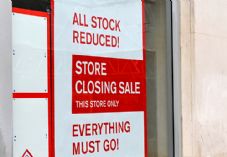UK DIY News
KPMG/IPSOS: Modest Retail Health Recovery In Q4

Following its latest health assessment, the KPMG/Ipsos Retail Think Tank (RTT) has determined that retail health saw a modest recovery in Q4 compared to the previous quarter. The RTT’s Retail Health Index (RHI) – a quantitative and qualitative assessment of demand, margin and costs – rose by a point, bringing the index to 68. This follows on the back of the strong recovery of six points in Q3.
With the latest BRC-KPMG Retail Sales Monitor showing total annual sales up by 1.8% in December, the RTT collectively agreed that the retail sector had made an unexpected bounce back in Q4. The increase was helped by a positive October, after Covid restrictions had been lifted and strong demand for food, especially premium food and drink as some consumers were determined to enjoy their Christmas (in the absence of “eating out” and normal family gatherings, due to the pandemic restrictions). Food sales which represent approximately 50% of retail expenditure in the UK, performed very well in the quarter (given the near shutdown of the pub, cafe and restaurant sector) and there were also strong sales for items associated with the home, such as technology.
A strong improvement in demand for food was the main driver of better health in Q4, but RTT members also agreed that this resulted in less need for heavy discounting by retailers in the run up to Christmas. Margins were held relatively stable, even though some retailers used Black Friday discounts to encourage people to buy early to avoid last minute logistics spikes.
However, unlike Q3 (where a reduction of costs had contributed to the improved health of the sector), freight related costs and the big shift to online shopping, partly caused by the November closure of non-essential stores, had a slightly negative impact on the sector’s health this quarter. RTT members noted the shift to more online shopping led to a significant increase of costs associated with order fulfilment and delivery, with acknowledgment that many supermarket chains did an excellent job of ramping up online delivery capacity for Christmas.
Supply chain issues also contributed to higher costs for retailers with freight container prices increasing substantially and many having to re-engineer supply chains to become closer to home to try and avoid chaos at the ports.
It was also noted by RTT members that some cost savings accounted for in Q3 such as the business rates holiday, that had helped drive retail health upwards, were not now being taken by all retailers, as several supermarkets and essential retailers announced in Q4 that they would be paying all or part of it back to the Government.
Reflecting on retail health in 2020, Paul Martin, KPMG’s UK Head of Retail, comments:
“This year has been a year of two sides of the coin for the retail sector. Food and home related items have seen impressive growth since the first lockdown, with retailers benefiting from a shift in expenditure from the travel, leisure and hospitality sectors. But retailers in the clothing sector or selling non-home related items will have found this year particularly difficult. Overall, we saw 60% of the UK retail market grow in 2020 and 40% decline.
‘’Retailers have had to deal with ensuring the safety of staff and customers which is paramount, opening and closing stores with very little notice and turning around robust online strategies quickly. It is also notable that the impressive organisational skills of the industry saw no bottleneck in feeding the nation earlier in the year and again in December and they were able to meet the huge demand for food and non-food to help consumers enjoy their Christmas.
“Relief from Government schemes and landlords have been a major contributor to retail health, and it is important that this remains in place as we continue in lockdown and tiered restrictions for the foreseeable future. It is a sign of the strength of some retailers that they are able to pay back business rates, and it is the right thing to do for those who can.
“That said, the overall health index for this quarter is still far lower than all previous years, so we cannot ignore the fact that many retailers are struggling, and consumer confidence remains low.”
Prospects for Q1 2021
Looking ahead to the next quarter, even though March will anniversary the start of the difficult period for retailers, the RTT forecasts that retail health will falter again and fall by two points, as the renewed surge in the pandemic takes its toll and the new national lockdown hits non-essential stores.
Consumer confidence is expected to fall away as a result of another lockdown, along with the unknown of how long it is likely to continue for. Also having faced restrictions for almost a year now, many consumers will already have purchased the items that they need for home nesting and working, and as the days get longer, many will turn their thoughts to saving for the leisure activities they have missed out on once restrictions are lifted. The quarter will continue with lockdown restrictions and constraints on consumers which will leave demand subdued. It is anticipated that only in the second half of 2021, after a successful and speedy vaccine rollout, will demand see a strong recovery.
Margins are also expected to suffer in Q1 as retailers try to clear stock. Costs too are likely to continue to rise, particularly around the supply chain and the labour required to meet online demands. Retailers with products that do not meet the rules on the amount of local content, are also expected to see increased costs associated with tariffs and exporters will also face extra costs due to the bureaucracy post Brexit.
Dr Tim Denison, Director of Retail Intelligence at Ipsos, comments:
‘’Following the bounce in retail health in Q4, the next quarter is likely to paint a very different picture, as the possibility of lockdown extension becomes ever more likely if compliance by the public remains poor. Consumers may resume saving for sociable activities such as holidays, recreation and entertainment in times to come.
“Retailers will be facing a triple whammy at the start of 2021 of subdued demand, thinner margins and rising logistics cost, which will make this another challenging quarter. Consumers are well versed in how to live through a lockdown now, so we don’t envisage a return to the panic stockpiling that happened in Q1 last year.
Source : KPMG-IPSOS Retail Performance
Insight DIY is the only source of market information that I need and they always have the latest news before anyone else.











































